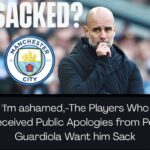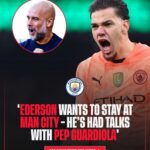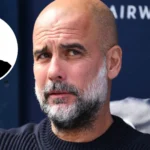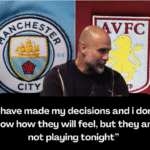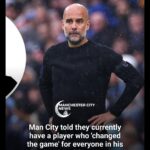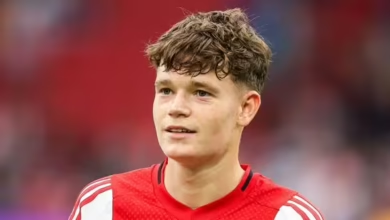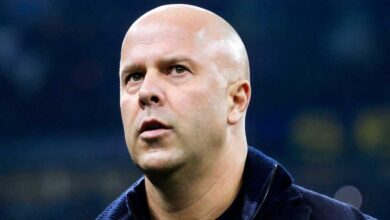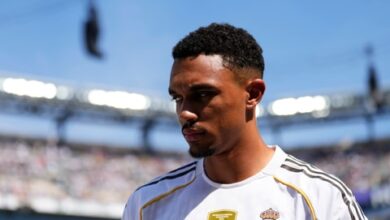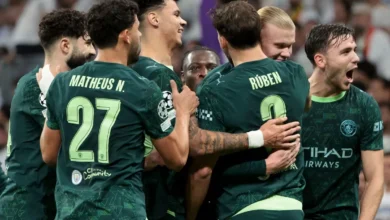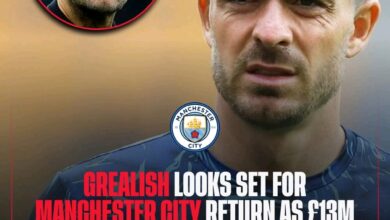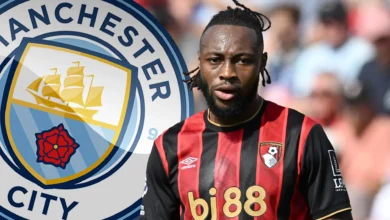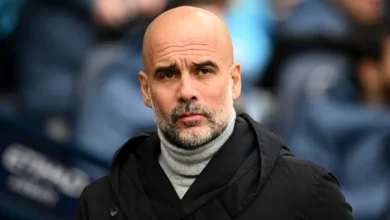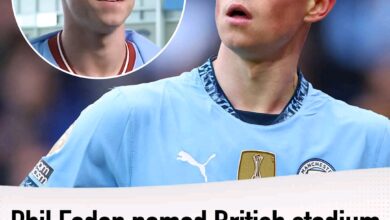Ederson, Haaland, Rodri – Man City injury news and return dates ahead of FA Cup semi-final

In the high-pressure world of elite football management, public admissions of error are scarce. For Manchester City’s Pep Guardiola—widely regarded as one of the greatest tactical minds in football history—such moments are particularly unusual. Throughout his nine-year tenure at the Etihad Stadium, the Catalan coach has built a reputation for unwavering conviction in his decisions, preferring to conduct his man-management behind closed doors while maintaining a united front in public.
This week, however, Manchester City supporters witnessed something out of character from their decorated manager. Following City’s hard-fought victory against Aston Villa, Guardiola did something that has become increasingly rare during his illustrious career—he publicly apologized to one of his players.
“I’ve been so unfair with him in the last games,” Guardiola admitted candidly when discussing Jeremy Doku’s limited playing time in recent fixtures. “Because I remember the games against Spurs away and Brighton, for example. Without him it would not be possible, but the only reason that they have not played lately is because we didn’t attack in the last games, with wingers – we were more full-backs wide, and more players in the middle like Bournemouth. But it’s only my reason. I feel sorry for him and for other ones.”
In the highly scrutinized world of Premier League management, such transparency about selection decisions represents a departure from Guardiola’s typically guarded approach. The headlines practically wrote themselves: “Pep Guardiola APOLOGISES to Man City player.” But what makes these moments significant isn’t just their rarity—it’s what they reveal about Guardiola’s evolving approach to man-management and the delicate balancing act required to maintain harmony within one of world football’s most talented squads.
For a manager who has amassed an unprecedented collection of trophies across his spells at Barcelona, Bayern Munich, and Manchester City, Guardiola’s public apologies serve a strategic purpose. They are calculated interventions designed to motivate players who have fallen out of favor, to rebuild confidence, and in some cases, to send clear messages about what is expected for them to regain their place in the team.
Sports psychologists often point to public acknowledgment as a powerful tool for maintaining player engagement. By publicly recognizing a player’s contributions and expressing regret for their limited opportunities, Guardiola achieves multiple objectives: he validates the player’s frustrations, reinforces their value to the squad, and potentially reinvigorates their determination to fight for their place.
Dr. Emma Richardson, a sports psychology consultant who has worked with several Premier League clubs, explains: “Public acknowledgment from a figure like Guardiola carries enormous weight. For players experiencing reduced playing time, hearing their manager publicly affirm their value can be a crucial psychological boost. It transforms what might feel like rejection into a tactical decision, giving players something concrete to work with rather than leaving them to question their abilities.”
This approach represents a notable evolution in Guardiola’s management style. During his earlier years at Barcelona and Bayern Munich, he was often characterized as uncompromising and somewhat inflexible regarding player selection. At City, however, he has increasingly demonstrated a willingness to adapt his communication style to meet the needs of different personalities within his squad—particularly as the demands of competing across multiple competitions have necessitated deeper squad rotation.
Jeremy Doku’s situation exemplifies the complex selection dilemmas Guardiola faces with his talent-rich squad. Signed from Rennes in the summer of 2023 for approximately £55 million, the Belgian winger made an immediate impact with his explosive pace and dribbling ability. His early-season performances, particularly a stellar display against Liverpool, suggested City had found another dimension to their already formidable attack.
However, as the 2024-25 season progressed, Doku found himself increasingly relegated to substitute appearances. The emergence of Savinho as a reliable option on the right wing, combined with Guardiola’s tactical shift toward inverted full-backs and additional central midfielders in certain matches, limited opportunities for traditional wingers in the City system.
Doku’s reduced playing time sparked speculation about his future at the club, with several European heavyweights reportedly monitoring his situation. Guardiola’s public apology appears timed to address these concerns, reassuring both the player and his representatives that his absence from the starting lineup is tactical rather than performance-based.
“With Jeremy, it’s a matter of tactical fit for specific opponents rather than any dissatisfaction with his performances,” explains former City defender Joleon Lescott. “Pep’s system demands different profiles in different games. Against low blocks, he might prefer the technical security of additional midfielders. Against teams that press high, Doku’s ability to break lines becomes invaluable. The challenge for any young player at City is accepting that rotation is inevitable given the quality throughout the squad.”
Guardiola’s apology to Doku follows a pattern emerging in recent seasons—a willingness to publicly acknowledge the difficult position of quality players who find themselves on the periphery despite strong performances when called upon.
Perhaps no player has received more public expressions of regret from Guardiola than Jack Grealish. The England international’s £100 million transfer from Aston Villa in 2021 remains the most expensive in British football history, bringing with it enormous expectations and scrutiny. While Grealish played a significant role in City’s treble-winning 2022-23 campaign, his third season at the club has seen his minutes significantly reduced.
“I’m so sorry he doesn’t get the minutes that maybe he deserves,” Guardiola acknowledged candidly in February 2025. “But [in] the end, the contributions from Jeremy or Savinho have been massive this season, this is the only reason why. It’s not personal, or [that] I don’t like Jack, or I don’t have confidence in him.”
A month later, Guardiola revisited the theme when questioned about Grealish’s limited opportunities: “I feel so sorry for the players who do not play. When we have games every three days the rotation is easy but now I have to decide every game for the quality the players have.”
These apologies highlight the impossible mathematics of Guardiola’s selection dilemmas. With only eleven starting positions and often more than twenty world-class players vying for inclusion, even a coach of Guardiola’s tactical versatility cannot accommodate everyone. In Grealish’s case, the emergence of younger talents like Savinho and the continued excellence of Phil Foden have created a formidable obstacle to regular playing time.
What distinguishes Guardiola’s handling of Grealish, however, is the dual approach of public sympathy paired with clear expectations. While expressing regret over the winger’s limited opportunities, the City manager has also been forthright about the areas where improvement is needed.
“Jack knows what he has to do,” Guardiola stated following a Champions League fixture earlier this season. “The quality is there—nobody doubts this. But in this team, at this level, you need more than quality. You need consistency, work rate, and decisive contributions in the final third. This is what I demand from all our attacking players.”
Former City captain Vincent Kompany, now managing Premier League side Burnley, believes this balance between encouragement and challenge reflects Guardiola’s mastery of modern player management: “What makes Pep different is how he can be simultaneously supportive and demanding. He’ll publicly back a player while privately setting extremely high standards. Players respect this because they know both sides are genuine—he truly does feel sorry they’re not playing, but he also truly believes they need to raise their level to get back in the team.”
If Guardiola’s expressions of regret to Doku and Grealish represent strategic man-management, his December 2023 apology to Kalvin Phillips stands as perhaps the most extraordinary public statement of his managerial career.
“I feel so sorry for my decisions for him, I said many times. He doesn’t deserve not to give him minutes. I’m so sorry,” Guardiola said, appearing genuinely remorseful about the midfielder’s situation.
What made these comments particularly remarkable was that they came just days after Guardiola had publicly criticized Phillips’ physical condition, stating the England international had returned from the 2022 World Cup “overweight” and “not in the right condition to train.” This initial criticism, followed by a heartfelt apology, created a narrative around Phillips that ultimately proved difficult to overcome.
Phillips, signed from Leeds United for £45 million in the summer of 2022, arrived at City with high expectations. Dubbed the “Yorkshire Pirlo” for his performances under Marcelo Bielsa, Phillips was viewed as the natural successor to Fernandinho in City’s holding midfield role. Instead, his City career became a cautionary tale of how difficult it can be to adapt to Guardiola’s exacting standards and tactical system.
Despite Guardiola’s public apology and expressed desire to give Phillips more opportunities, the midfielder made just two Premier League starts before being loaned to West Ham United in January 2024. A subsequent loan to Brighton & Hove Albion for the 2024-25 season signaled that his long-term future likely lies away from the Etihad.
Sports journalist Sam Lee, who covers Manchester City for The Athletic, believes Phillips’ situation reveals the limitations of public apologies: “Sometimes these apologies are genuine attempts to rejuvenate a player’s confidence, but they can also serve as public acknowledgment that a transfer hasn’t worked out. With Phillips, you sensed a genuine regret from Pep that he couldn’t find a way to integrate him into the team, but also an acceptance that some signings, despite everyone’s best intentions, simply don’t fit.”
While Guardiola’s public apologies have become more frequent in recent seasons, one of the earliest examples came during his second season at City. In December 2017, following a period where Raheem Sterling had delivered several crucial late goals despite not always starting matches, Guardiola made a point of publicly recognizing the forward’s patience and professionalism.
“I apologize to Raheem for not playing him more often,” Guardiola stated after Sterling scored a dramatic late winner against Southampton. “He deserves more minutes, but we have so many games and I try to find the best for the team in each moment.”
What made this early apology notable was that it came during a period of success for both player and team. Sterling was enjoying his most productive season to date, while City were in the midst of what would become a record-breaking 100-point Premier League campaign. Rather than addressing dissatisfaction, Guardiola’s apology served to reinforce Sterling’s value to the squad during a period of rotation.
This pattern—apologizing to players who remain important contributors despite not starting every match—has become a hallmark of Guardiola’s management at City. It reflects his understanding that modern football requires more than just a strong starting eleven; it demands a fully engaged squad where even those not currently in favor remain motivated and ready to contribute.
While these public apologies reveal a more empathetic dimension to Guardiola’s management style, it would be misleading to suggest he has become universally conciliatory. For every public apology, there are instances where Guardiola has remained resolute in his decisions despite player dissatisfaction.
John Stones experienced this first-hand during his early years at City, when Guardiola repeatedly left him out of the team and publicly questioned aspects of his game. Rather than apologizing for these decisions, Guardiola maintained that Stones needed to adapt to meet his expectations. The defender’s subsequent development into one of City’s most reliable performers suggests this tougher approach can also yield results.
Similarly, Guardiola has rarely expressed public regret over his handling of Bernardo Silva, despite regularly deploying the Portuguese in positions away from his natural role. Instead, he has consistently praised Silva’s adaptability and professionalism, focusing on the player’s willingness to sacrifice for the team rather than acknowledging any potential frustration.
This selective approach to public apologies underscores a fundamental aspect of Guardiola’s philosophy: he believes certain qualities—adaptability, tactical intelligence, positional flexibility—are non-negotiable for players in his system. Those who demonstrate these traits rarely receive apologies because, in Guardiola’s view, they’re fulfilling their fundamental role as squad members regardless of their specific position or minutes.
“With Pep, there’s always a method behind how he communicates with different players,” explains Xabi Alonso, who played under Guardiola at Bayern Munich and now manages Bundesliga side Bayer Leverkusen. “Some players respond to the challenge of proving him wrong. Others need reassurance and public backing. The mark of his evolution as a manager is recognizing which approach works with which personality.
Guardiola’s increasing willingness to publicly apologize to players represents one facet of his broader evolution as a manager during his time at Manchester City. When he arrived in 2016, fresh from his spell at Bayern Munich, Guardiola was often characterized as uncompromising in his principles. Early struggles adapting to the Premier League led to a famous declaration that he would not change his approach: “I’m not going to change. I’m going to be sacked because of that.”
Nine years and multiple trophies later, Guardiola has maintained his core footballing philosophy while demonstrating remarkable adaptability in his man-management approaches. The increased frequency of public apologies coincides with the changing demographics of his squad—younger players brought up in the social media era, where public perception and affirmation carry significant weight.
Dr. Bill Beswick, a renowned sports psychologist who has worked with several top clubs and managers, sees this evolution as a sign of Guardiola’s emotional intelligence: “The truly great managers understand that different eras and different generations require adjusted approaches. What worked with the Barcelona squad of 2009 might not be effective with the City squad of 2025. Guardiola’s willingness to publicly acknowledge players’ situations shows he understands the modern player’s need for transparency and validation.”
This evolution has coincided with City’s unprecedented era of domestic dominance, suggesting that Guardiola’s more nuanced approach to public communication has contributed to maintaining harmony within a squad filled with world-class talent. By acknowledging the difficult position of players not currently in favor, he has helped foster a culture where squad rotation is accepted rather than resented.
Analyzing the timing of Guardiola’s public apologies reveals another dimension to their strategic nature. They typically occur during one of three scenarios: following a significant victory (when positivity is high throughout the squad), during congested fixture periods (when rotation becomes inevitable), or after a period where a player has been consistently overlooked despite the team’s struggles.
His recent apology to Jeremy Doku came after City’s crucial victory over Aston Villa, which strengthened their Champions League qualification hopes. The timing was significant—with momentum building toward the season’s conclusion and an FA Cup semi-final against Nottingham Forest approaching, Guardiola needed all his attacking options motivated and ready to contribute.
Similarly, his expressions of regret regarding Jack Grealish’s limited opportunities often coincide with periods where City face multiple competitions simultaneously, suggesting a calculated effort to ensure the England international remains engaged ahead of fixtures where he might be called upon.
This pattern highlights the pragmatic underpinning of Guardiola’s public comments. While genuine in their sentiment, these apologies are rarely spontaneous outpourings of emotion; instead, they represent calculated interventions designed to maintain squad harmony during crucial periods of the season.
For every Doku, Grealish, or Phillips who has received a public apology from Guardiola, there are numerous players who departed Manchester City without such acknowledgment. The absence of apologies can be equally telling about Guardiola’s assessment of a player’s attitude or suitability for his system.
Leroy Sané left for Bayern Munich in 2020 after falling out of favor, with Guardiola never publicly expressing regret over the German winger’s reduced playing time. Similarly, Oleksandr Zinchenko, Gabriel Jesus, and Raheem Sterling all departed for Arsenal and Chelsea respectively without Guardiola offering public apologies for their limited roles in their final seasons.
This selectivity suggests that Guardiola reserves his public expressions of regret for players he believes are fully committed to the club’s project despite their frustrations. Those who push for exits or whose attitudes he questions rarely receive the same public backing.
“There’s always a method to how Pep communicates about players,” notes former City defender Micah Richards. “If he’s apologizing publicly, it usually means he sees a future for that player at the club and wants to keep them motivated. When he stays quiet about someone’s situation, it often means he’s already decided they’re not part of his long-term thinking.”
The ultimate measure of these public apologies’ effectiveness lies in how players respond on the pitch when given opportunities. The record here is mixed, suggesting that while public backing can provide a psychological boost, it cannot overcome fundamental tactical incompatibilities or performance issues.
Jack Grealish has shown flashes of brilliance following Guardiola’s public support but has struggled to consistently recapture the form that made him one of England’s most exciting talents at Aston Villa. Kalvin Phillips’ City career effectively ended despite Guardiola’s apology, with the midfielder unable to adapt to the specific demands of City’s system.
Jeremy Doku, the most recent recipient of a Guardiola apology, will hope to buck this trend. His explosive pace and one-on-one dribbling ability offer qualities that remain unique within City’s squad, potentially making him a crucial option as the season reaches its conclusion.
Former City captain Richard Dunne believes these mixed outcomes reflect the reality of elite football: “A manager’s apology might give you confidence, but at a club like City, you still need to deliver exceptional performances to displace world-class teammates. The apology gets you in the right frame of mind, but ultimately, it’s what you do with the opportunity that matters.”
As Manchester City’s squad has evolved from ambitious challengers to established winners, Guardiola’s approach to public communication has adapted accordingly. His increasing willingness to publicly apologize to players who find themselves on the periphery despite strong performances reflects the complex challenge of managing a squad where nearly every player could justifiably expect to start for most other clubs.
These apologies serve multiple purposes: they acknowledge players’ frustrations, maintain squad harmony, send messages about expected standards, and potentially head off transfer requests from valuable squad members. Their effectiveness ultimately depends on the individual player’s personality and circumstances, but they represent one tool in Guardiola’s increasingly sophisticated approach to man-management.
As City continue their pursuit of domestic and European honors, Guardiola’s ability to keep his entire squad engaged and motivated remains crucial. In a sport where margins continue to narrow at the elite level, the psychological edge gained from having fully committed squad players can often prove decisive during the season’s crucial moments.
For Guardiola, these public apologies represent more than just personal remorse—they are strategic communications designed to extract maximum performance from one of football’s most talented squads. As City enter the final phase of Guardiola’s ninth season at the helm, his evolution from uncompromising idealist to pragmatic man-manager stands as one of the most significant developments in his illustrious coaching career.
The real test of these apologies’ effectiveness will come in the crucial fixtures that remain this season. If players like Doku and Grealish can deliver decisive contributions when called upon, Guardiola’s approach will once again be vindicated. If not, it may prompt yet another evolution in how football’s most cerebral manager communicates with his players during challenging periods.
What remains clear is that in the high-stakes world of elite football management, even public apologies are rarely just expressions of regret—they are calculated interventions designed to achieve specific outcomes. For Guardiola, the ultimate goal remains unchanged: maximizing the performance of his squad as they pursue the trophies that will further cement his legacy as one of football’s greatest managers.
